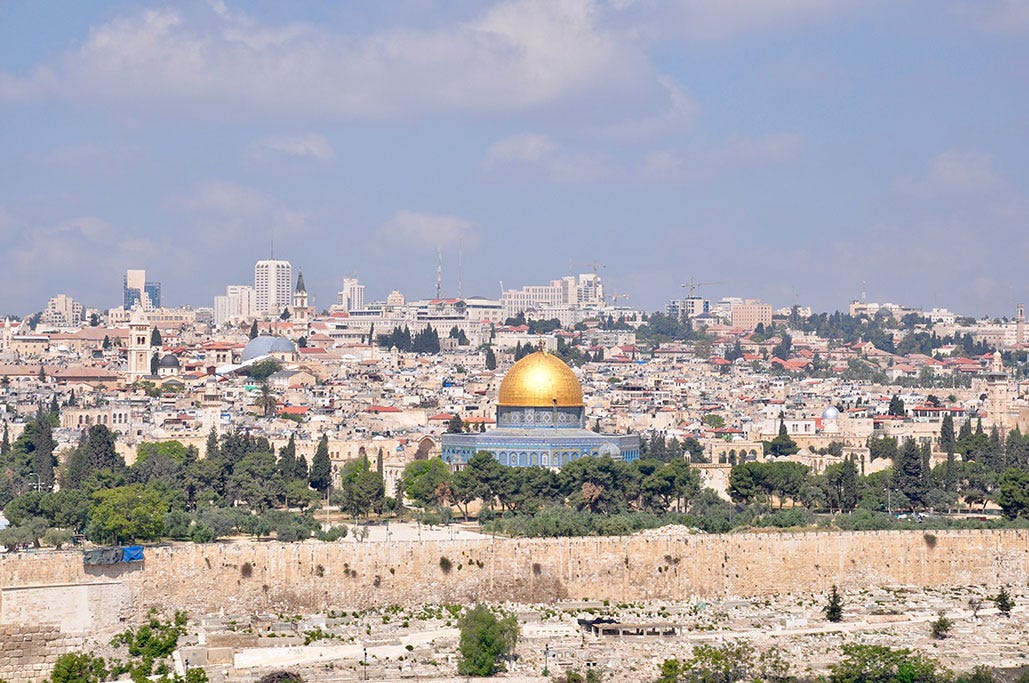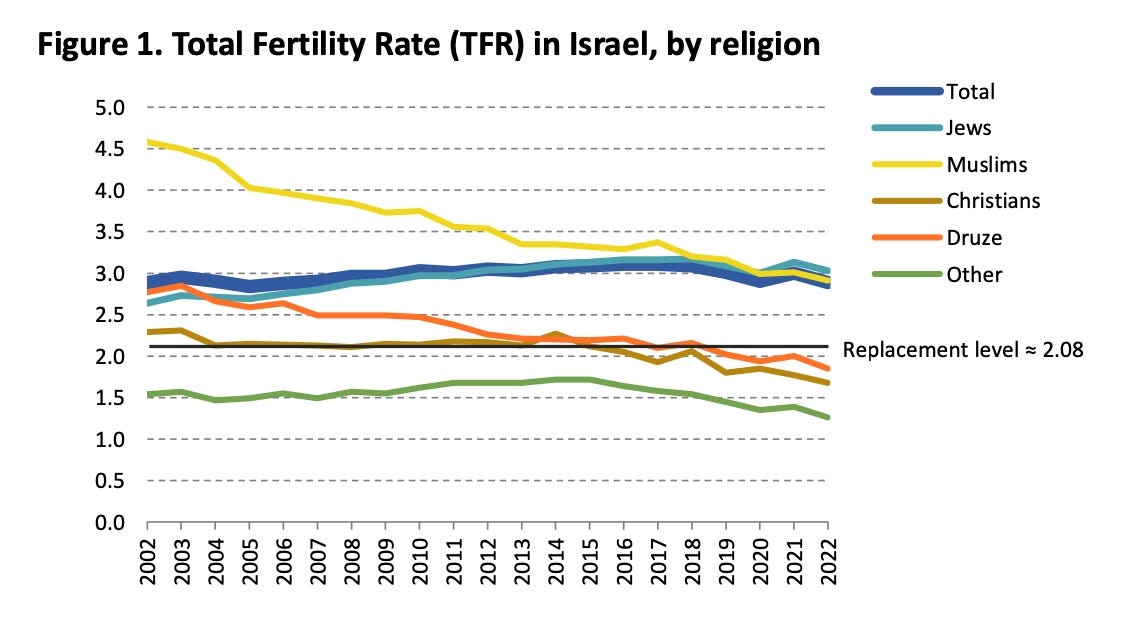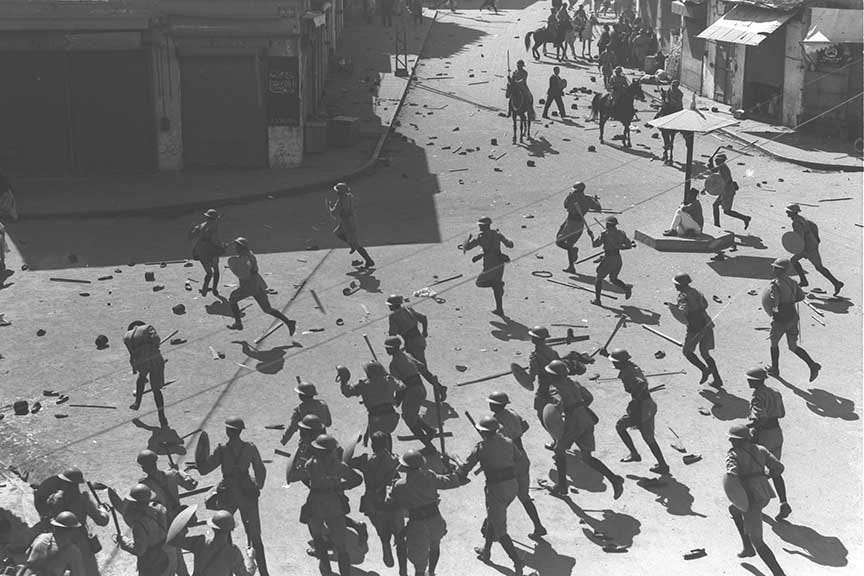DAY 135 OF THE GAZA WAR: Rafah Next? Temple Mount, Fertility in Israel, No Unilateral Recognition of Palestinian State
Tel Aviv Diary, February 18, 2024
GAZA
The IDF has announced that operations in Khan Younis are nearing completion. Today's search at Al-Nasr Hospital led to the discovery of additional Hamas operatives. The question now is — What happens next? Israel has indicated that Rafah will be its next target, though the exact timing of this operation remains unclear. Former Defense Minister Gantz has cautioned that if a deal is not reached by Ramadan (March 10 this year), Israel plans to initiate operations in Rafah during the Ramadan holiday. This strategy is intended to exert pressure, which could potentially have some positive impact.
As I wrote last night, there is a growing chorus of voices in Rafah criticizing Hamas and demanding that the terror group relinquish control. It's challenging to gauge the extent to which Hamas's rule is at risk. However, when examining the history of nearly every dictatorship — and Hamas fits that category — it appears invulnerable, until, all of a sudden, it isn’t.
ACCESS TO THE TEMPLE MOUNT ON RAMADAN
There was a special meeting with the Prime Minister to discuss access to the Temple Mount during the upcoming Ramadan. National Security Minister Ben-Gvir proposed prohibiting all West Bank residents from visiting the Temple Mount during this period, and severely restricting access for Israeli Arabs as well. Both the Army and the Security Services vehemently opposed Ben-Gvir’s proposal. The Defense Establishment argued that the issue of the Temple Mount has thus far been excluded from the wartime discourse, and such a move would thrust Temple Mount access into the spotlight, and thereby complicate matters further for the IDF.
Concerned about Ben-Gvir potentially breaking up his coalition, Netanyahu tentatively agreed with the Minister’s proposal, despite the Army's opposition. Netanyahu consented to limit access to the Temple Mount for West Bank Palestinians by age, currently planning to permit only those above 60 and below 11. The Prime Minister also authorized the imposition of some unspecified restrictions on Arab Israelis. Ben-Gvir stands as the sole figure on the right to have seen a rise in the polls (albeit not dramatically), prompting Netanyahu’s concern that Ben-Gvir might indeed be prepared to topple the government. Were Netanyahu truly a leader, he would challenge Ben-Gvir's threat. Ben-Gvir is aware that should an election be called, the current government would not remain in power, and under any new government constellation, he would likely not hold a ministerial position. In my opinion, this is a terrible decision.
QUESTIONS FROM READERS
Following the Zoom briefing this evening, I received several additional questions. One reader asked if I think a strong public relations effort for Israel is needed. I wholeheartedly believe that a robust PR strategy is essential. For over 40 years, I have championed this cause, even during times when I had the ear of decision-makers, yet this imperative investment of resources never came to fruition. A public relations strategy should be envisioned as a long-term commitment, not just a wartime effort. Unfortunately, politicians tend to focus on short-term gains, prioritizing expenditures that can immediately attract votes. Consequently, I firmly believe that a significant portion of American Jewry should redirect their financial support towards educating the American public about Israel, rather than sending money directly to Israel.
Another question posed to me was: Do you genuinely believe there is no strategy in place for the “day after” [the conflict]? Or is it possible that there are plans which Netanyahu's team cannot disclose? Alternatively, could there be various planned scenarios that adapt based on the outcomes of the war and the outcome of the situation with the hostages?
I am sure that Netanyahu has some ideas in his head regarding the next in Gaza. Yet, he has not disclosed any of those insights to the IDF, which has repeatedly expressed the need for such plans. There seems to be no strategy for Northern Gaza, an area Israel controls, but does not administer. The question remains: Who should be administering Northern Gaza now? Without an alternative plan, Hamas will prevail, since their supporters have the most guns.
NETANYAHU & GANTZ, NO UNILATERAL RECOGNITION FOR PALESTINIAN STATE
After today's cabinet meeting, both Prime Minister Netanyahu and Former Defense Minister Gantz expressed their opposition to the unilateral recognition of a Palestinian State by the US, or any other entity. Of course, the key word was "unilateral." The US Ambassador to Israel, Jack Lew, clarified this evening that the US has no plans to unilaterally recognize a Palestinian State. Instead, the US believes in a political process that could potentially pave the way for the establishment of a Palestinian State.
FROM THE TAUB REPORT
The report contains a lengthy section on fertility and population trends. Below, I will summarize the section on fertility.
Beginning in 2018, fertility rates in Israel began to decline. This decrease in fertility has been observed across Jewish, Arab, and Christian communities.
Fertility rates are highest among the ultra-Orthodox population, yet even in this group, a downward trend is noticeable. Among secular communities, fertility rates are at their lowest.
BUSINESS
The startup Clarity, which is developing a platform for detecting deepfakes, has raised $16 million in a Seed-round led by Walden Catalyst Ventures and Bessemer Venture Partners. The round also included participation from Fusion Fund, Secret Chord Ventures, Ascend Ventures, and Flying Fish Partners, as well as over 70 angel investors from the cyber and academic fields, including Ofer Ben-Noon, founder of Talon, Selvick Markowitz, and Udi Mokady, co-founders of CyberArk. Clarity was founded in 2022 by Michael Matias (CEO), Natalie Friedman (CTO), and Gil Avriel (CSO & COO).
The startup company Seal Security, which is developing a Generative AI-based platform for the automatic repair of security vulnerabilities in open source code, announces a Seed-funding-round of $7.4 million. The round was led by Vertex Ventures, with participation from Crew Capital, PayPal Alumni Fund, and private investors including serial entrepreneur Ariel Maislos and Cyber Club London, which brings together leading security professionals from around the world. Seal Security leverages advanced LLM technologies to develop capabilities for repairing security vulnerabilities in open-source code. This innovative approach enables the repair of over 95% of critical vulnerabilities in the five most widely used programming languages, without the need for development personnel intervention in companies.
Lava announced the completion of a seed-funding round of $15 million, led by venture capital funds Jump Capital, Hashkey Capital, and Tribe Capital. Additionally, the round included participation from funds such as Alliance, Node, North Island, Quiet, Finality, Dispersion Capital, as well as angels in the field and other blockchain networks like Starkware, Celestia, Filecoin. Lava was founded in 2022 by CEO Yair Kalper and CTO Gil Binder. According to the company's data, it currently employs 26 people. Lava developed a first-of-its-kind marketplace protocol for information from the blockchain.
–––––∞––––––∞––––––∞––––––∞––––––∞––––––∞––––––∞––––––
A PIECE OF HISTORY
Arab Riots of 1920-21
The first serious bouts of violence after the establishment of the mandate broke out in 1920. In February, a group of Arab marauders attacked the settlements of Metulla and Tel Chai. Joseph Trumpeldor, who had been the leader of the Zion Mule Corps during World war I and was one of the heroes of Yishuv, was killed in the attack.
Riots erupted in Jerusalem on April 4, 1920, coinciding with the Muslim holiday of Nebi Mussah. The rioting went on for three days. On the first day alone, 150 Jews were wounded. By the time the disturbances subsided, there were numerous injured and several fatalities. Vladamir Jabotinsky was convinced that the Jews had to defend themselves, and he quickly organized a group to protect against the rioters. Initially, the British authorities gave Jabotinsky the green light, but later reversed their decision and arrested the Jewish defenders when they entered the Old City.
Most of the Arab rioters were never charged by the British, with only two exceptions. In contrast, members of the Jewish self-defense group led by Jabotinsky were each sentenced to 15 years in prison. The sentence sparked significant outcry, leading to the establishment of a commission of inquiry. A British intelligence officer testified that some of the British military officers colluded with the Arabs. Consequently, the sentences against Jabotinsky and his comrades were dismissed. As a result, the British government decided to turn the governance of Palestine over to a civil administration. The Arabs had hoped to influence the outcomes of the San Remo Conference, which was convening to affirm the British mandate, a move most Arabs opposed. However, their actions did not alter the conference's decision.
On May 1, 1921, the Achdut Avoda (a socialist Zionist organization) organized a march with police approval to advocate for workers' rights. Concurrently, the Jewish Communist party also planned a march advocating for the establishment of a Communist state in Palestine, without police authorization. Despite the lack of approval, they proceeded with their march. When the two groups encountered each other, clashes ensued.
In the midst of the chaos, Arabs in Jaffa began to assault Jewish residences throughout the area, resulting in numerous fatalities. The Jewish hostel, a reception point for new immigrants, was a notable target. Reports indicate that the police, summoned for assistance, participated in the attacks.
Fighting soon spread beyond Jaffa. A farm in Abu Kabir was attacked, resulting in the deaths of the owners, their sons, two tenants, and the writer Yosef Haim Brenner. The British High Commissioner Herbert Samuel called for reinforcements from Egypt to quell the unrest. By the time the turmoil had subsided, 47 Jews and 48 Arabs had died, with an additional 146 Jews and 73 Arabs injured. The majority of Arab casualties occurred during clashes with British troops attempting to suppress the riots.
One of the most immediate outcomes of the riots was the official establishment of Tel Aviv into a separate, independent city.
TODAYS ZOOM BRIEFING









Thanks Marc for the fine reporting and insights. A Piece of History segment is very much appreciated.
Hi Marc, I really enjoyed watching this zoom briefing. I think your readers asked some great questions and I can see that they are interested in the Palestinian struggle and the international criticism of the war. You talked at the end about how your society can reduce the fear among Israeli citizens against arabs. You have a platform here (I’m not sure how big) but maybe you could add a segment each day that speaks to the suffering in Gaza, international perspectives and some Palestinian perspectives. I think it is in Israelis citizens best interest to be informed about how the world is viewing this. And for them to see some of the horrific videos and images that us outside of Israel are seeing everyday.
And a little ps. You talk about how you don’t understand why the idf are blowing up universities and mosques. And one reader questioned how do the idf know that these doctors and journalist being executed are Hamas fighters. Those of us protesting don’t understand this either and we come to the conclusion that the very fabric of society in Gaza is being targeted so that there can be no future in Gaza and Palestinians have no choice but to leave into the Sinai dessert.